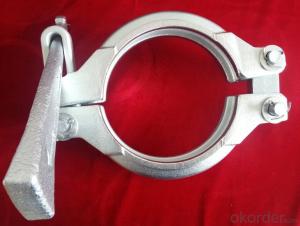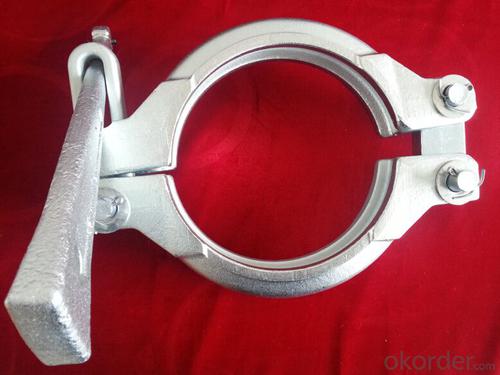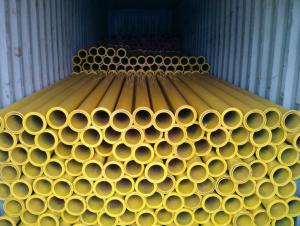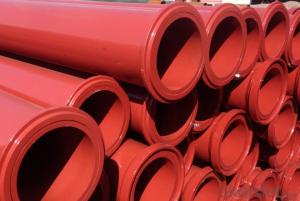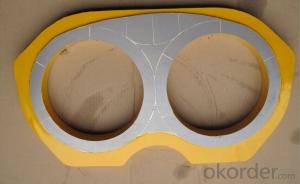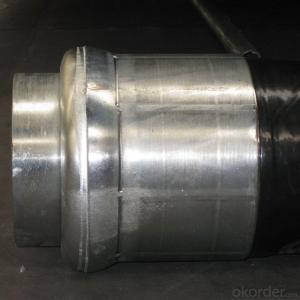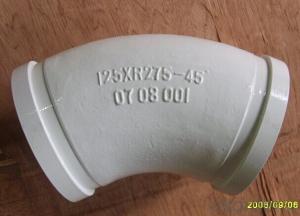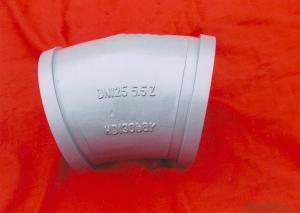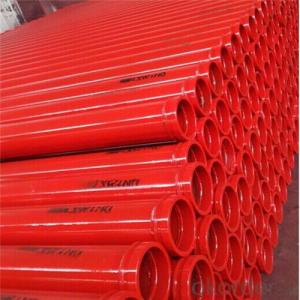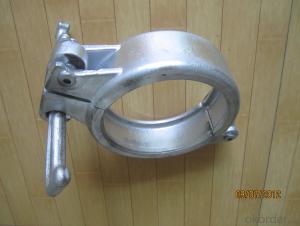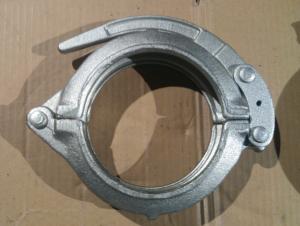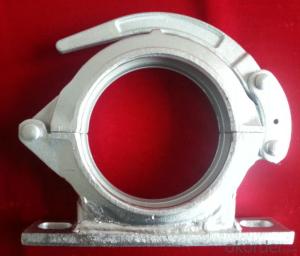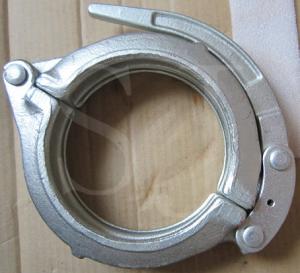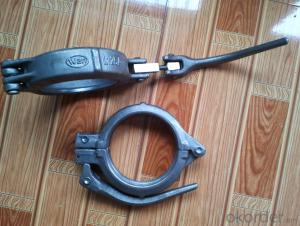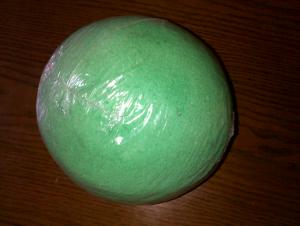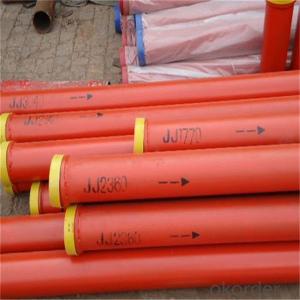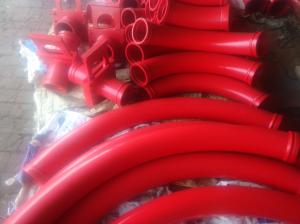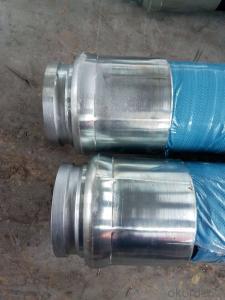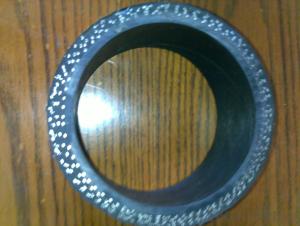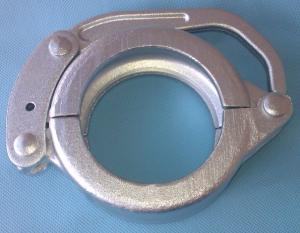Forged Wedge Coupling DN 125 with Hgh quality
- Loading Port:
- Tianjin
- Payment Terms:
- TT or LC
- Min Order Qty:
- 5 pc
- Supply Capability:
- 1000 pc/month
OKorder Service Pledge
OKorder Financial Service
You Might Also Like
Product Description:
Name:Forged Wedge Coupling DN 125 with Hgh quality
Type: Snap coupling, Bolt coupling, Wedge Coupling, adjustable or mounting type
Dimensions: DN125, 5"
Process: Casting or Forging.
Surface treatment: Painted or Galvanized.
Notes: total series of concrete pump clamp for different brand concrete pump(PUTZMEISTER, SCHWING, CIFA, SANY, ZOOMLION, IHI, KYOKUTO Etc) available from us, such as Snap coupling, Bolt coupling, Wedge Coupling, adjustable or mounting type .
Scope of Application of the Equipment
Forged Wedge Coupling DN 125 with Hgh quality widely used on concrete pump truck, concrete placing boom, trailer concrete pump etc, for concrete delivery pipe connection.
Our concrete pump clamps have been successfully exported to many countries from 1998, Our main markets as below: Middle East, Southeast Asia, America, Brazil, Italy, Russia, South Africa etc
Aiming at the largest concrete pump parts manufacturer, and reliable, professional supplier in China, we can supply concrete pump elbows, delivery pipes, casting or forging couplings, end rubber hoses, rubber pistons, tungsten wear plates, delivery cylinders, and other hydraulic parts, one stop service for your concrete pump parts and accessory business.
Product Advantages:
Forged Wedge Coupling DN 125 with Hgh quality are durable, strong, and resists corrosion.
Main Product Features:
· Premium quality
· Prompt delivery & seaworthy packing (10-20 days after receiving deposit)
Reliable performance
Easy and smooth operation
High safety.
· Professional Service
· Competitive pricing
Product Specifications:
Every 300pcs put in one seaworthy wooden box, and 20 boxes in one 20feet container.
FAQ:
Q1: Why buy Materials & Equipment from us?
A1: All products are through its ISO certifications, adhere to the highest standards and a commitment to supply chain safety and customer satisfaction.
Q2: How do we guarantee the quality of our products?
A2: We have established an advanced quality management system which conducts strict quality tests at every step, from raw materials to the final product. At the same time, we provide extensive follow-up service assurances as required.
Q3: How soon can we receive the product after purchase?
A3: Within three days of placing an order, we will begin production. The specific shipping date is dependent upon international and government factors, but is typically 10 to 30 workdays.
Q4: If we can produce some Forged Wedge Coupling DN 125 with Hgh quality according to customers request?
A4: Yes, we can produce Forged Wedge Coupling DN 125 with Hgh quality according to the difference country situations and different concrete pump to make it suitable to the market and customers. We have very professional technical team to make the design.
Q5: How to make a quick resolution for after service?
A5:We have overseas branches all-around of world, IF needed, the seller shall dispatch 2 engineers to the buyer's site for supervision of training. The buyer shall make available of necessary facilities &skilled personnel at site for training.
Images:
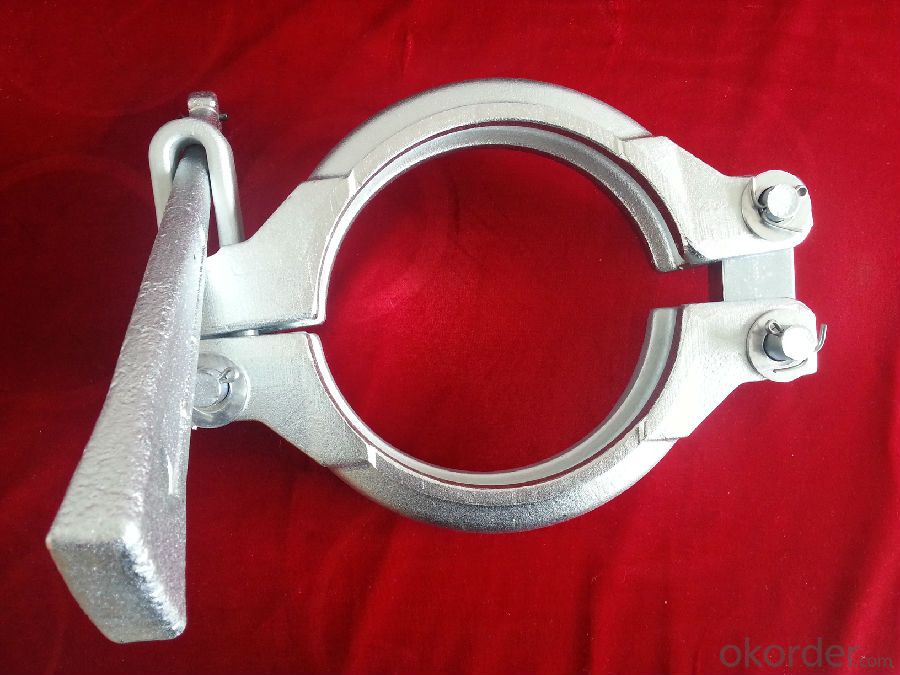
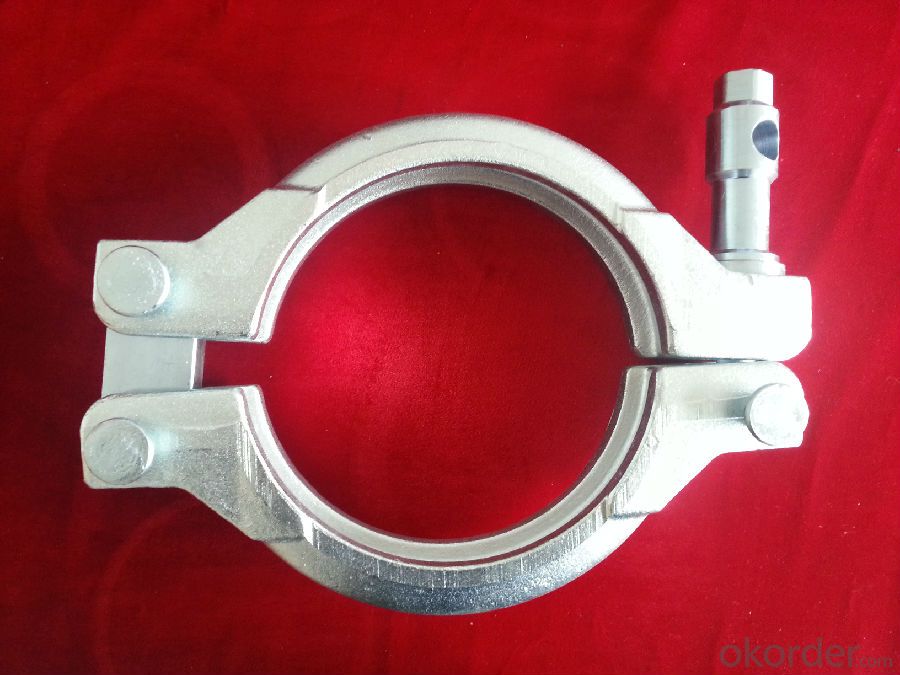
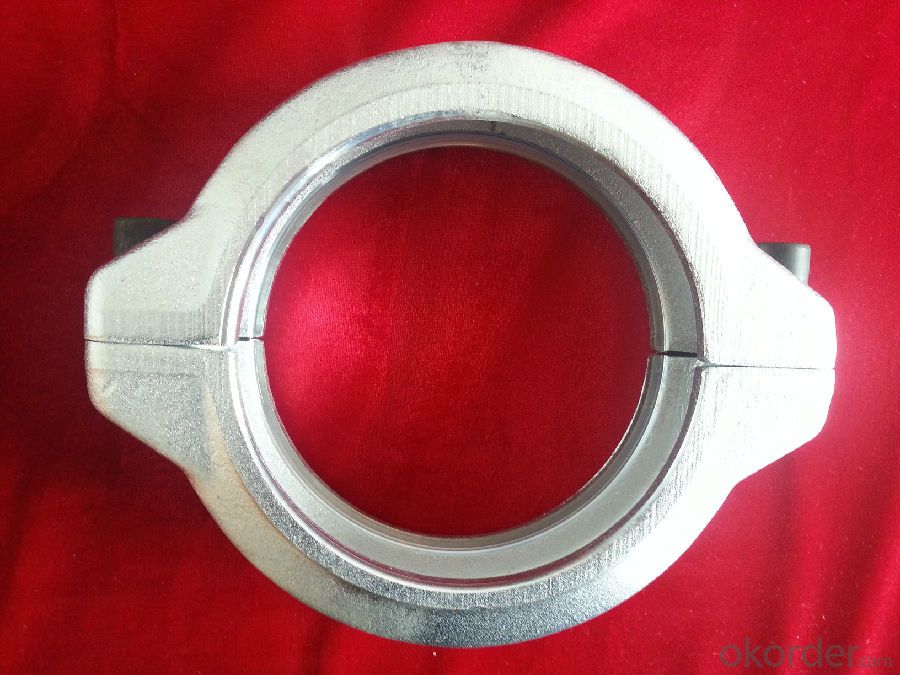
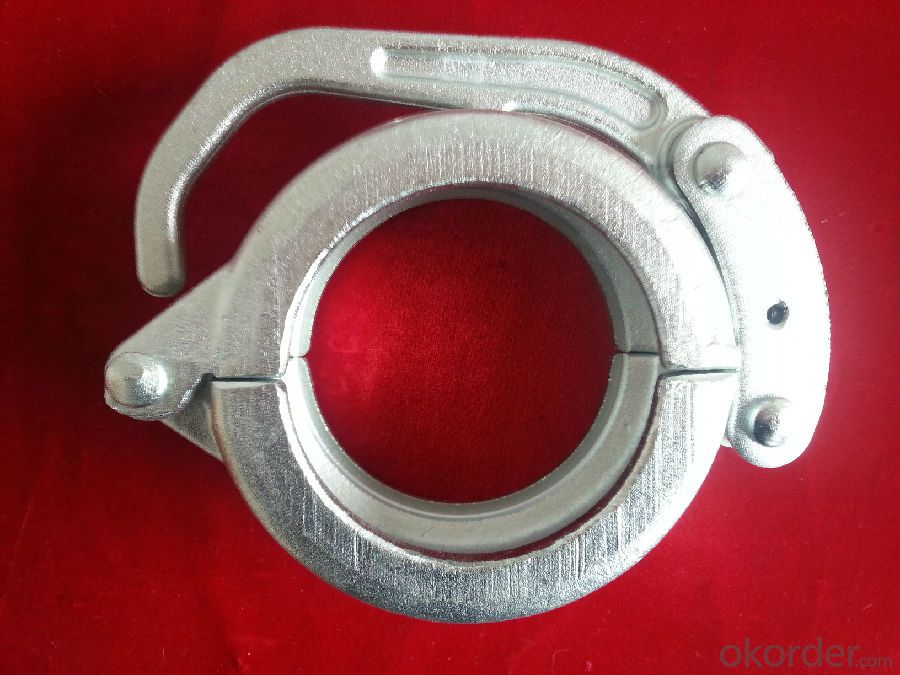
- Q: What are the signs of wear and tear in concrete pump spare parts?
- Concrete pump spare parts may exhibit signs of wear and tear, which should not be overlooked. Some indicators include: 1. Surface damage: Cracks, dents, or scratches on pipes and hoses can signify wear and tear, particularly if they are extensive or deep. 2. Corrosion: Metal components like couplings or clamps may display signs of corrosion such as rusting or pitting, which can weaken the part and affect its functionality. 3. Leaks: Notable leaks in seals or gaskets can suggest wear and tear. Material degradation or improper installation can cause leaks, impacting the pump's efficiency and performance. 4. Decreased performance: Wear and tear in concrete pump spare parts can result in reduced overall performance. For instance, worn-out wear plates can diminish pumping capacity or increase energy consumption. 5. Heightened noise or vibrations: If noise levels or vibrations intensify while operating the concrete pump, it may indicate wear and tear in the spare parts. Imbalances, misalignments, or loose components can negatively affect the pump's performance and lifespan. 6. Excessive wear on moving parts: Moving parts like pistons or cylinders may exhibit excessive wear and tear, such as scoring or grooving on the surface. This can impede the smooth operation of the pump and potentially cause further damage if left unaddressed. Regular inspection and maintenance of concrete pump spare parts are vital to promptly identify and address any signs of wear and tear. Timely replacement or repair of worn-out components can prevent further damage, ensuring the concrete pump operates efficiently and safely.
- Q: What are the potential risks of using non-standard or modified hydraulic components in concrete pump spare parts?
- The potential risks of using non-standard or modified hydraulic components in concrete pump spare parts include compromised safety and performance. Non-standard or modified components may not meet the necessary specifications or standards required for safe and efficient operation. This can result in increased wear and tear, reduced reliability, and potential failures, leading to accidents, injuries, or damage to the equipment. Additionally, the use of non-standard components may void warranties and make it difficult to find replacement parts in the future. It is crucial to use approved and genuine hydraulic components to ensure the proper functioning and longevity of the concrete pump.
- Q: How often should concrete pump control panels be inspected and replaced?
- Regular inspections should be conducted on concrete pump control panels to ensure proper functioning and detect any potential problems or malfunctions. The frequency of inspections may vary based on factors such as pump type, operating conditions, and manufacturer recommendations. However, a general rule is to thoroughly inspect the panels at least once every six months or after every 500 hours of operation, whichever comes first. Trained professionals should perform these inspections, examining control panel components like buttons, switches, indicators, and wiring for signs of wear or damage. They should also test all functions and safety features to verify the panel's functionality. When it comes to replacement, it is crucial to adhere to the manufacturer's guidelines and recommendations. Typically, control panels have a lifespan of several years, but this can vary depending on factors like panel quality, frequency of use, and maintenance practices. If significant issues or failures are identified during inspections, prompt replacement of the control panel is important to ensure safe and efficient operation of the concrete pump. Ultimately, regular inspections and timely replacement of control panels are vital to minimize the risk of equipment failure, maintain safety on construction sites, and preserve the productivity and longevity of the concrete pump.
- Q: How do I identify the right spare part for my concrete pump model?
- To identify the right spare part for your concrete pump model, you should start by referring to the user manual or documentation provided by the manufacturer. This will usually include a detailed parts list and diagrams specific to your model. If you don't have access to the manual, you can contact the manufacturer or a reputable supplier for assistance. They will require information such as the pump model number, serial number, and specific details about the part you need. It's important to provide as much accurate information as possible to ensure you get the correct spare part for your concrete pump.
- Q: What is the farthest pumping distance of concrete pump truck?
- Now the domestic pump to achieve the highest pump height, the largest is ZOOMLION made 80 m carbon fiber boom pump, but also to achieve the pump Guinness world record
- Q: What are the types, classifications and specifications of concrete pump?
- In accordance with the export pressure rating label, divided into low pressure pump (5MPa), medium pressure and high pressure pump pump (6-10MPs) (>10MPa)
- Q: Are there any specific cleaning procedures for concrete pump spare parts?
- Yes, there are specific cleaning procedures for concrete pump spare parts. It is important to ensure that these parts are clean and free from any dirt or debris to maintain their efficiency and longevity. Here are some general guidelines to follow when cleaning concrete pump spare parts: 1. Safety First: Before starting the cleaning process, make sure to wear appropriate personal protective equipment (PPE) such as gloves and safety goggles to protect yourself from any potential hazards. 2. Disconnect Power: Before cleaning any electrical or mechanical parts, make sure to disconnect the power supply to avoid any accidents. 3. Remove Excess Dirt: Use a brush or a dry cloth to remove any loose dirt or debris from the surface of the spare parts. This will make the cleaning process more effective. 4. Use Appropriate Cleaning Solution: Depending on the type of spare parts and the level of dirt, choose an appropriate cleaning solution. Mild detergents or soapy water are generally safe to use. Avoid using harsh chemicals or solvents that may damage the parts. 5. Scrub and Rinse: Dip a clean cloth or sponge into the cleaning solution and gently scrub the spare parts to remove any stubborn dirt or stains. Rinse the parts thoroughly with clean water to remove any residue of the cleaning solution. 6. Dry Completely: After rinsing, make sure to dry the spare parts thoroughly using a clean cloth or by air-drying. Moisture can lead to rust or corrosion, so it is important to ensure complete drying. 7. Lubricate Moving Parts: If the spare parts have any moving components, such as bearings or gears, apply an appropriate lubricant to ensure smooth operation. This will help prevent wear and tear and extend the lifespan of the parts. 8. Regular Maintenance: To keep the concrete pump spare parts in optimal condition, it is recommended to perform regular cleaning and maintenance. Inspect them periodically for any signs of damage or wear and replace them if necessary. By following these specific cleaning procedures, you can effectively clean and maintain the concrete pump spare parts, ensuring their reliability and longevity.
- Q: What is the function of a concrete pump hopper filter?
- Preventing damage and blockages, the concrete pump hopper filter's main function is to keep large debris, like rocks, out of the pump. It acts as a barrier between the hopper and the pump, ensuring that only properly sized aggregate and concrete mixture is pumped through. By reducing the risk of clogs and wear on the equipment, the filter helps maintain the pump's efficiency and longevity. Moreover, it removes unwanted contaminants, thus preserving the quality of the pumped concrete. In construction projects, the concrete pump hopper filter plays a crucial role in safeguarding the pump and ensuring a seamless and uninterrupted flow of concrete.
- Q: How can one identify the need for replacement of concrete pump spare parts?
- One can identify the need for replacement of concrete pump spare parts by observing any signs of wear and tear, such as cracks, leaks, or damage to the components. Additionally, a decrease in pump performance, unusual noises, or difficulty in operation can indicate the need for replacement. Regular maintenance and inspection can also help in identifying any potential issues with the spare parts that may require replacement.
- Q: What are the common signs of wear and tear in a concrete pump cylinder?
- Some common signs of wear and tear in a concrete pump cylinder include cracks or fractures on the surface, loss of smoothness or rough texture, leakage of hydraulic fluid, reduced pumping efficiency or pressure, and increased noise or vibration during operation.
Send your message to us
Forged Wedge Coupling DN 125 with Hgh quality
- Loading Port:
- Tianjin
- Payment Terms:
- TT or LC
- Min Order Qty:
- 5 pc
- Supply Capability:
- 1000 pc/month
OKorder Service Pledge
OKorder Financial Service
Similar products
Hot products
Hot Searches
Related keywords
